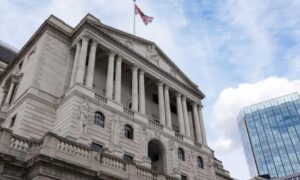
Bank of England policymakers signalled at least three interest rates cuts this year after seeing “encouraging signs” of falling inflation as they kept interest rates on hold at 5.25% for a fifth time.
The financial markets expect three cuts of 0.25 percentage points this year, forecasting the first to take place in June. The Bank said its survey of financial companies found that they expected rates to fall to 4.5% before the end of 2024.
Inflation has decreased sharply in recent months, with the consumer prices index falling to 3.4% in February. That was still above the Bank’s 2% target, but well below a peak reading of 11.1% in October 2022.
Eight members of the Bank’s rate-setting monetary policy committee (MPC) voted to hold interest rates, while the ninth, Swati Dhingra, backed a cut of 0.25 percentage points. It was the first time since September 2021 that no one on the MPC voted for a rate rise.
The pound fell against the dollar and euro as investors calculated they would get a lower interest rate this year on their UK deposits than was previously forecast. Sterling was down 0.6% against the dollar at $1.27, and down 0.2% against the euro at €1.16 after the announcement.
Andrew Bailey, the Bank’s governor, said: “In recent weeks we’ve seen further encouraging signs that inflation is coming down. We’ve held rates again at 5.25% because we need to be sure that inflation will fall back to our 2% target and stay there.
“We’re not yet at the point where we can cut interest rates, but things are moving in the right direction.”
The MPC said it expected economic growth to begin picking up in the second quarter of the year after national output, as measured by gross domestic product, shrank in the second half of 2023, pushing the UK into recession.
Businesses are on course to raise investment levels and higher disposable incomes are expected to lead to an increase in demand for goods and services.
Higher growth would normally increase the pressure on prices, but the government’s fuel duty freeze in addition to recent falls in the price of energy and food is expected to push inflation below 2% in the second quarter.
Martin Beck, the chief economic adviser to the EY Item Club, said the MPC was worried about “stickiness in private sector pay growth and services inflation, and a tight jobs market” but that the case for cutting rates soon remained strong.
“Lower energy prices mean inflation is likely to fall below the Bank of England’s 2% target in April and remain sub-target for the rest of the year. And timelier indicators of pay growth compared to the standard year-on-year measure have already fallen to a pace consistent with the 2% goal,” he said.
Carsten Jung, a senior economist at the left-of-centre IPPR thinktank, said the sharp fall in inflation showed “the Bank of England tightened the screws too much, which is squeezing much-needed future growth”.
Suren Thiru, the economics director at the accountancy body ICAEW, said the heavy toll of 14 rate rises over the last two years had yet to be fully felt.
